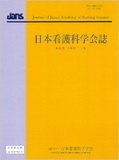Japanese
English
- 販売していません
- Abstract 文献概要
- 参考文献 Reference
要旨
目的:大学病院一般病棟看護師の共感疲労の実態,共感疲労と労働遂行能力の関連を明らかにする.
方法:都内の大学病院一般病棟看護師301名に,自記式質問紙調査を実施した.
結果:192名を分析対象とした(有効回答率63.8%).共感疲労と労働遂行能力に有意な関連はなかった.サブグループ解析では共感疲労と労働遂行能力の間に負の相関のある個人および職場の特性は,35から44歳,看護師経験年数10年以上,トラウマティックな経験をした患者家族のケア経験有り,理不尽な患者家族のクレーム対処経験有り,非常に混乱した患者家族のケア経験有り,急変時の看取り経験有りの群(p < .05)であった.
結論:共感疲労は継続性,蓄積性のある複雑な現象で,その把握のためには年齢や経験年数,ケア内容等個人が置かれている状況を丁寧に分析する必要がある.
Purpose: To clarify the actual conditions of compassion fatigue of nurses working in the general ward of a university hospital, and the association between compassion fatigue and work performance.
Methods: A self-administered questionnaire was distributed among 301 nurses in the general ward of a university hospital in Tokyo.
Results: For 192 subjects (response rate 63.8%), there was no significant association between compassion fatigue and work performance. Subgroup analysis, based on demographics and workplace characteristics, showed negative correlations between compassion fatigue and work performance. Results indicated that groups showing negative correlation consisted of participants aged 35-44 years of age, had more than 10 years of experience as a nurse, cared for patients and families with traumatic experiences, handled unreasonable complaints of patients and families, dealt with extremely upset patients and families, and cared for patients during sudden changes (p < .05).
Conclusions: Compassion fatigue is a complex phenomenon which continues and accumulates. In order to understand this condition, it is necessary to carefully analyze the situation based on individual characteristics of nurses such as age, years of experience, and conditions of care.
Copyright © 2022, Japan Academy of Nursing Science. All rights reserved.


